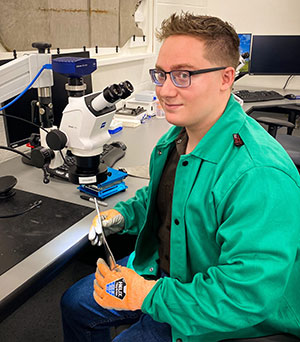2024 Steel Intern Scholarships
 Daniel L. Newton
Daniel L. Newton
My experience as a metallurgy intern in the research and development division of Carpenter Technology Corp. in Reading, Pa., USA, has been an enjoyable learning opportunity and chance to get involved with the steel industry. I was given an array of characterization projects to work on, focusing on stainless steels and other alloy systems. Carpenter produces alloys for aerospace, military, automotive, and medical applications, where quality and performance are critical.
My first project was creating a presentation on delta ferrite for an internal microstructure database. This involved literature review, metallography, and microscopy to provide background information and contextualize delta ferrite, explaining how it affects performance as a phase in microstructures in addition to practical considerations in processing. With guidance from senior employees, I developed a heat treatment plan to produce delta ferrite in stainless steel samples to obtain micrographs for the presentation.
 Additional tasks involved working on projects from the strip finish mill, primarily investigations on nonconforming test samples. I received different grades of stainless steel nonconforming samples after bend, tension and hardness testing. Each case study involved communication with the production team to prepare samples for analyses on grain sizes, surface depths and other features. Performing data analyses and comparing results I obtained was a rewarding way to develop my skill set and contribute to company objectives.
Additional tasks involved working on projects from the strip finish mill, primarily investigations on nonconforming test samples. I received different grades of stainless steel nonconforming samples after bend, tension and hardness testing. Each case study involved communication with the production team to prepare samples for analyses on grain sizes, surface depths and other features. Performing data analyses and comparing results I obtained was a rewarding way to develop my skill set and contribute to company objectives.
My efforts extended to the lab services sector on occasion, which refers to when customers send a Carpenter alloy to R&D for characterization. Microstructure, chemistry, mechanical properties and phase analyses are conducted per customer request to report information they are interested in. Lab services jobs can range from all stages of downstream processing at customer sites, from initial processing steps to finished components that were in service. Results from data collection are organized and written in report form to provide clients with the information and data they request. Working on lab services jobs and writing reports was a rewarding, engaging way to develop my technical writing ability and gain insight on important considerations in downstream processing.
Throughout the internship, I had the opportunity to participate in various tasks to gain understanding about the operations of Carpenter Technology. I was able to attend sessions on alloys, product offerings for different business sectors and safety meetings given by experts in the field. I gained familiarity with the equipment, processes and resources at the Reading facility through my work at the R&D lab and mill tours. Mill tours were provided for interns, during which we were guided through production facilities and given information on their operations. The most notable tours involved observing forging operations in action. Seeing the rotary forge work on multiple bars facilitated a deeper understanding of hot working processes by watching physical changes happen in real time.
As my internship progressed, my tasks evolved toward linking scientific, conceptual aspects of metallurgy to the practical, production aspects. For most projects I worked on, developing a presentation to communicate results was required. This process involves the practical side of explaining the subject and how data was collected and interpreted, to the conceptual side to provide a scientific rationale for the topic. My projects required meticulous preparation, imaging and analyses to provide actionable insights. Communicating projects through contextualizing their importance for the company, the methodology behind data collection, interpretation of results, and suggestions for the future furthered the link between practical and conceptual considerations in metallurgy. The process of starting a new project, getting necessary background information, collecting and analyzing data to provide insights, and conveying results reinforced my technical skills, knowledge, and communication abilities.
Overall, this internship provided the ideal setting and tasks to develop and apply my understanding of metallurgical processes. Getting hands-on experience with stainless steels, heat treatments, failure analysis and metallography built upon my skill set and aptitude. Working on numerous projects simultaneously enhanced my time management skills and lent insight into the workload of metallurgists. Conveying results through technical reports and presentations enhanced my conceptual understanding and refined my professional documentation and communication. This experience has been fundamental to preparing for a future career in the steel industry, serving as a chance to demonstrate skills and knowledge I started with, while gaining proficiency and metallurgical acumen.
